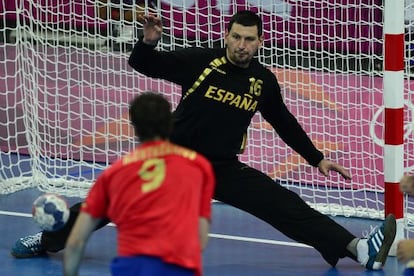
After a traumatic organization process filled with obstacles of the mostly monetary kind, Spain becomes the showcase for global handball over the next two-and-a-half weeks as it hosts the men's world championship.
It is the first time the country has played host to the biannual tournament in 23 editions and the occasion provides a chance for its national team to get to the top of the podium once again after its gold medal-winning performance in Tunisia in 2005.
What's more, a good showing from the home side could also provide a much-needed shot in the arm for a sport currently going through a critical moment.
Unable to capitalize on its recent successes - since 1996 it has won three Olympic, four European and two world championship medals - Spain's third sport in terms of federated participants (96,258, according to the Higher Council of Sports' latest figures, putting it behind soccer and basketball) is limping along with very few funds in the piggy bank.
Spain got its campaign off to a winning start on Friday night with a 27-14 victory in the opening game against Algeria in the capital's La Caja Mágica stadium - the new location of all the team's Group D matches after the original venue, the Madrid Arena, was ruled out after the Halloween night tragedy there in which five young women attending a macro party were killed in a human crush.
Spain arrives with one of its most complete teams of recent years
Also in Spain's group are Australia, Croatia - bronze medalists at the London Olympics over the summer - Egypt and Hungary. The top four from each group go through to the next round.
Other group matches will be held at Granollers in Barcelona province and the Catalan capital's Palau Sant Jordi - the two sites where reigning world and Olympic champion, and tournament favorite, France plays its Group A matches - Zaragoza, which hosts Serbia's Group C and where if all goes well Spain will play its last 16 and quarterfinal matches; and the Palacio de Deportes San Pablo in Seville, which hosts Denmark and the rest of Group B.
The group phase goes on until January 19 with the final due to take place in the Palau Sant Jordi in Barcelona on January 27.
Spain arrives at the championship with one of its most complete teams of recent years. With a line-up of players ranging from the newly arrived 20-year-old Aitor Ariño to 36-year-old veteran Alberto Entrerríos, who coach Valero Rivera has brought back into the team after leaving him out of his squad for the London Olympics, it is a team that bears comparison with Vicente del Bosque's all-conquering national soccer side.
Based around a giant of a goalkeeper - quite literally in the case of two-meter-tall Serbia-born, Spanish nationalized Arpad Sterbik - it is a team that all works together, full of great players all arriving at this most important of moments at their sporting peak.
Like Del Bosque's group it also bears the unmistakable seal of Barcelona, where eight of its 16 squad members play and Rivera also once played and later managed.
In his fourth year in charge, a title still eludes the national coach. After achieving a bronze medal in the 2011 world championship in Sweden, Spain suffered a painful quarterfinal defeat to France in London over the summer, a loss comparable to the one it suffered against Germany at the Athens Olympics in 2004, also in the quarters.
That disappointment proved the precursor to the victory in Tunisia, the one time Spain has gone all the way. Maybe the hour has come for it do so once again.
Tu suscripción se está usando en otro dispositivo
¿Quieres añadir otro usuario a tu suscripción?
Si continúas leyendo en este dispositivo, no se podrá leer en el otro.
FlechaTu suscripción se está usando en otro dispositivo y solo puedes acceder a EL PAÍS desde un dispositivo a la vez.
Si quieres compartir tu cuenta, cambia tu suscripción a la modalidad Premium, así podrás añadir otro usuario. Cada uno accederá con su propia cuenta de email, lo que os permitirá personalizar vuestra experiencia en EL PAÍS.
¿Tienes una suscripción de empresa? Accede aquí para contratar más cuentas.
En el caso de no saber quién está usando tu cuenta, te recomendamos cambiar tu contraseña aquí.
Si decides continuar compartiendo tu cuenta, este mensaje se mostrará en tu dispositivo y en el de la otra persona que está usando tu cuenta de forma indefinida, afectando a tu experiencia de lectura. Puedes consultar aquí los términos y condiciones de la suscripción digital.









































